VIETNAM – CUBA
Time-honoured closeness and affection

Referring to Cuba is referring to the island nation of heroes, with strong compassion and will. Vietnam and Cuba have a special, pure and loyal friendship, which is very rare in international relations. The attachment to the noble revolutionary ideals and the fight for independence and freedom have created sympathy, understanding, and sharing between the two peoples located in the east and west halves of the globe, cultivating deep affection that has gone through more than 60 years with the many ups and downs of history.
Vietnam and Cuba cultivate special friendship and comprehensive cooperation
Politburo member and President Nguyen Xuan Phuc and a high-ranking Vietnamese delegation have left for an official visit to Cuba from September 18-20 at the invitation of First Secretary of the Communist Party of Cuba (CPC) Central Committee and President of Cuba Miguel Díaz Canel. This is the first high-level visit to Cuba made by a Vietnamese leader after Cuba successfully organised the 8th Congress of the CPC and Vietnam successfully organised the 13th National Party Congress. President Nguyen Xuan Phuc’s visit to Cuba is an important event in the relationship between the two countries, affirming the closeness and fidelity and a solid continuation in the special friendship and comprehensive cooperation between Vietnam and Cuba.
The special solidarity and friendship between the two Parties, States and peoples were formed on the basis of a history of resilient and indomitable fighting for independence, freedom, sovereignty and people's right to self-determination. It was initiated by President Ho Chi Minh and leader Fidel Castro and nurtured by generations of leaders and people of the two countries. Over the course of more than 60 years, since the two countries established the diplomatic relations on December 2, 1960, the special friendship and comprehensive cooperation between Vietnam and Cuba have been continuously consolidated and developed in a sustainable manner, bringing practical effects in the cause of building and defending socialism and socio-economic development in both countries.
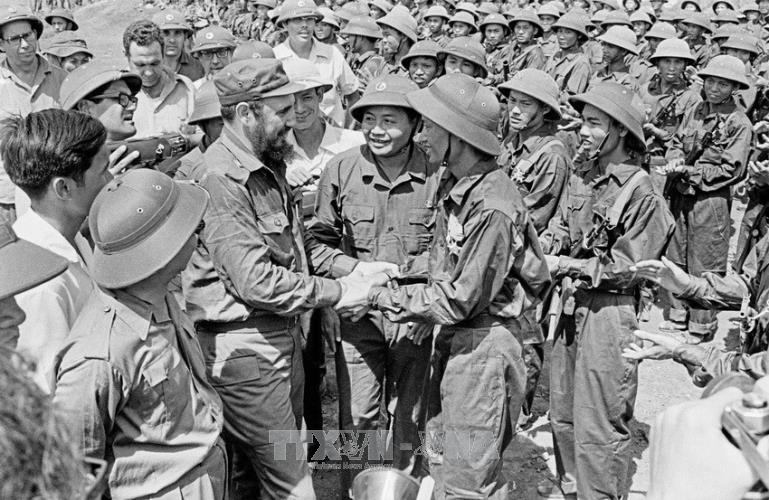
Cuban leader Fidel Castro and Khe Sanh battalion’s soldiers during his visit to the liberated zone in Quang Tri Province on September 15, 1973. (Photo: VNA)
Cuban leader Fidel Castro and Khe Sanh battalion’s soldiers during his visit to the liberated zone in Quang Tri Province on September 15, 1973. (Photo: VNA)
The Vietnamese people will forever remember the solidarity and unconditional support of the Cuban people. Leading in the international movement in support of Vietnam and being the first country in the Western Hemisphere to establish full diplomatic relations with Vietnam, Cuba has always provided valuable economic and military assistance to Vietnam during difficult times in the fight for liberation and reunification. Despite the danger, Fidel Castro was the first and only foreign Head of State to pay a visit to a newly liberated area in the central province of Quang Tri. Fidel’s immortal statement “For Vietnam, we are even willing to give our own blood” has always stayed in the hearts of the Vietnamese people.
Over the years, Vietnam-Cuba relations have continued to be consolidated and developed in all fields. Political relations are increasingly closer, mutual trust has been strengthened, senior leaders of the two sides have maintained regular visits and exchanges. Economic and trade cooperation has been promoted, through cooperation and investment programmes and projects, notably Vietnam's projects on supporting Cuba to develop rice production. Vietnam is the second largest trading partner and the largest investor in the Asia-Oceania region in Cuba. More and more Vietnamese businesses are investing in Cuba, taking advantage of the strengths and support of the two economies, especially in the fields of energy, production of construction materials, consumer goods, and tourism infrastructure. The two countries have maintained coordination and mutual support at multilateral forums and international organisations. Vietnam has consistently stood side by side with Cuba and asked the US to lift its encirclement and embargo policies against Cuba.
The affection between Vietnam and Cuba is clearly shown in the joint fight against the COVID-19 pandemic, which is causing negative impacts on the global scale. As soon as the pandemic broke out, Vietnam and Cuba gave each other support with gifts, practical aid shipments, maintaining solidarity, and sharing, imbued with the time-honoured spirit of mutual assistance in difficult times.
The visit to Cuba by President Nguyen Xuan Phuc and the high-ranking Vietnamese delegation is made at an important time, with Cuba having just completed the process of transferring the revolutionary leadership generation and Vietnam having just elected a new leadership board with new development goals. The visit represents a continuation of the close, loyal, and pure relationship between the two countries, continuing to cultivate the special friendship and promoting the comprehensive cooperation between Vietnam and Cuba in a deep, practical and sustainable manner.
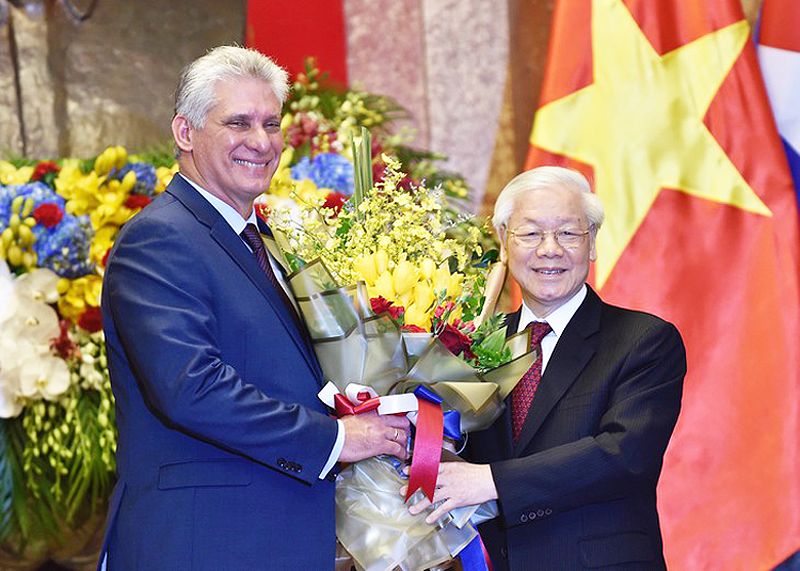
Party General Secretary and President Nguyen Phu Trong and Cuban President Miguel Díaz-Canel before their talks in Hanoi on November 9, 2018. (Photo: VGP)
Party General Secretary and President Nguyen Phu Trong and Cuban President Miguel Díaz-Canel before their talks in Hanoi on November 9, 2018. (Photo: VGP)
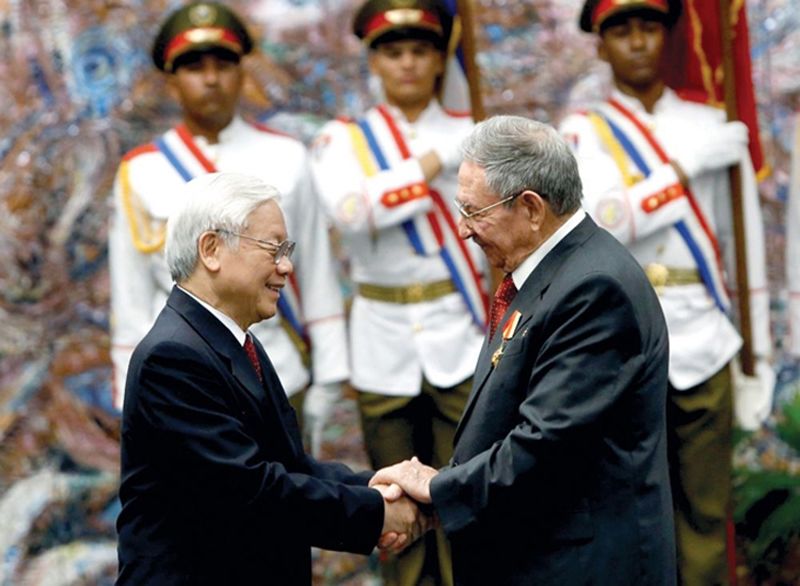
General Secretary Nguyen Phu Trong meets First Secretary of the Communist Party of Cuba (PCC) Central Committee cum President of the Council of State and Council of Ministers of Cuba Raúl Castro during his State visit to Cuba in March 2018. (Photo: MOFA)
General Secretary Nguyen Phu Trong meets First Secretary of the Communist Party of Cuba (PCC) Central Committee cum President of the Council of State and Council of Ministers of Cuba Raúl Castro during his State visit to Cuba in March 2018. (Photo: MOFA)
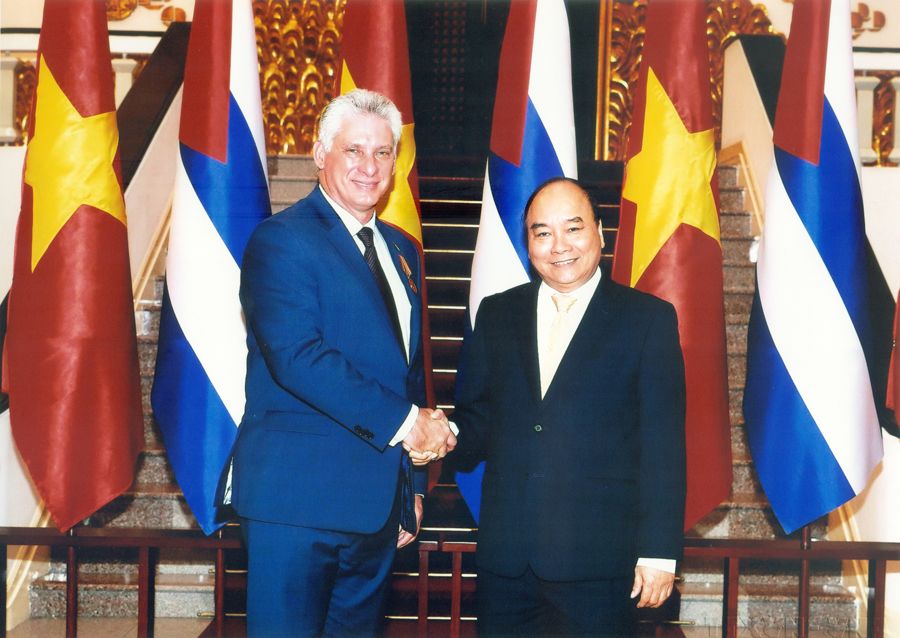
Cuban President Miguel Díaz-Canel meets Prime Minister Nguyen Xuan Phuc during his visit to Vietnam in November 2018. (Photo: VNA)
Cuban President Miguel Díaz-Canel meets Prime Minister Nguyen Xuan Phuc during his visit to Vietnam in November 2018. (Photo: VNA)
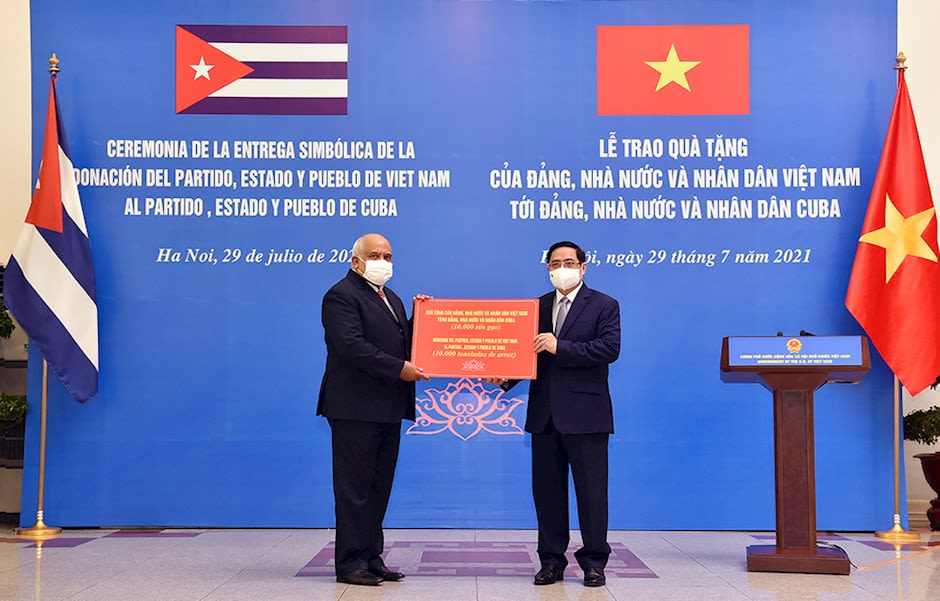
Prime Minister Pham Minh Chinh symbolically hands over the gift of 10,000 tonnes of rice from the Party, State and people of Vietnam to Cuba on July 29, 2021 (Photo: VNA)
Prime Minister Pham Minh Chinh symbolically hands over the gift of 10,000 tonnes of rice from the Party, State and people of Vietnam to Cuba on July 29, 2021 (Photo: VNA)
A symbol of willpower
July 26, 1953, was recorded in the Cuban history as the anniversary of Revolution Day - the day Fidel Castro led the attack on Moncada Fortress, opening the revolutionary fight to overthrow the dictator Batista, a henchman of the imperialists. The unsuccessful opening attack did not cause the iron-willed soldiers to give up their revolutionary goal.
On the early morning of November 25, 1956, the ship Granma brought Fidel and 81 Cuban patriotic soldiers from Mexico across the ocean to return to the Fatherland to continue the fight. On December 2, 1956, the historic landing on the home island was completed, but Fidel’s forces were surrounded and attacked by Batista’s army. After the unequal battle, only 12 brave soldiers survived, then retreated to the rugged Sierra Maestra mountains to build a base.
With the support of the people, the Sierra Maestra revolutionary base was quickly consolidated and expanded, the armed struggle movement spread to all parts of the country, the insurgent force became more and more numerous, and claimed continuous victories on all fronts.
On January 1, 1959, the Cuban revolution was successful, the Cuban people and revolutionary soldiers under the leadership of Fidel overthrew the dictatorship, established the first worker-peasant state in the Western Hemisphere, ending nearly five centuries of colonial domination, bringing the country into a new era of independence, freedom and progress towards socialism. The birth of the socialist Cuban State has given great encouragement to oppressed peoples in the fight for independence.
But in order to strangle the fledgling government of independent Cuba, the US quickly imposed a policy of economic encirclement, initially with a trade embargo and export ban in October 1960; and two years later, with a full economic embargo against Cuba. The unreasonable unilateral policy of the US government continued, with the reason changing over time with the goal of tightening the siege over the resilient island nation.
However, steadfast in his will to be independent and self-reliant, affirming the socialist nature of the Cuban Revolution, Fidel led the people to fight unyieldingly, repeatedly defeating the plots of hostile forces. A living proof is the resounding victory of Girón on April 19, 1961, marking the first defeat of the US imperialists in the Western Hemisphere.

Fidel Castro and Cuban revolutionary leaders in June 1957, including Argentine hero Che Guevara (second from left) and Raúl Castro (front row). (Photo: VNA)
Fidel Castro and Cuban revolutionary leaders in June 1957, including Argentine hero Che Guevara (second from left) and Raúl Castro (front row). (Photo: VNA)
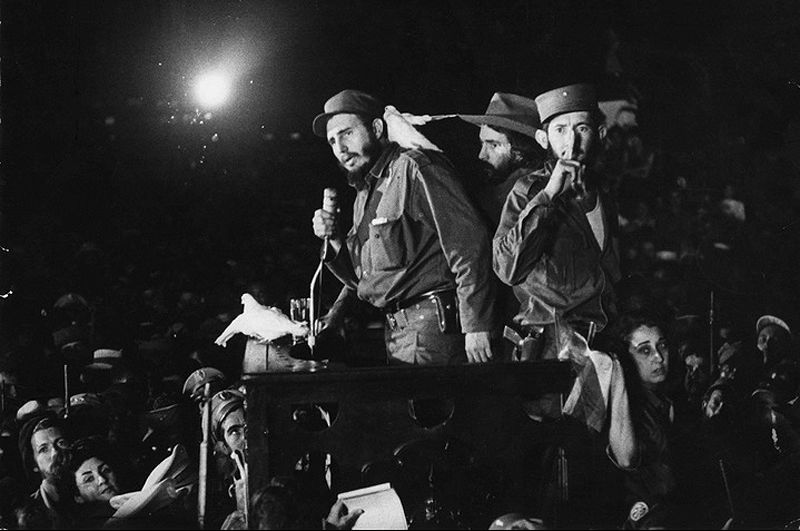
Guerrilla forces led by Fidel Castro enter Havana on January 1, 1959, forming an interim government. This event opened a new era for the Cuban people, an era of mastering their own destiny. (Photo: VNA)
Guerrilla forces led by Fidel Castro enter Havana on January 1, 1959, forming an interim government. This event opened a new era for the Cuban people, an era of mastering their own destiny. (Photo: VNA)
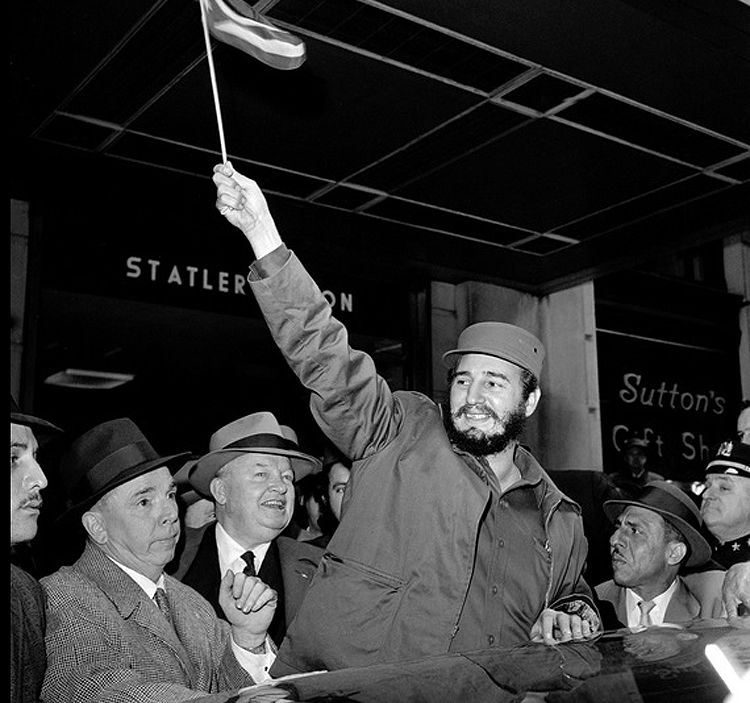
Soon after the success of Cuban Revolution, hostile forces carried out many conspiracies to destroy the fledgling revolution. (Photo: VNA)
Soon after the success of Cuban Revolution, hostile forces carried out many conspiracies to destroy the fledgling revolution. (Photo: VNA)
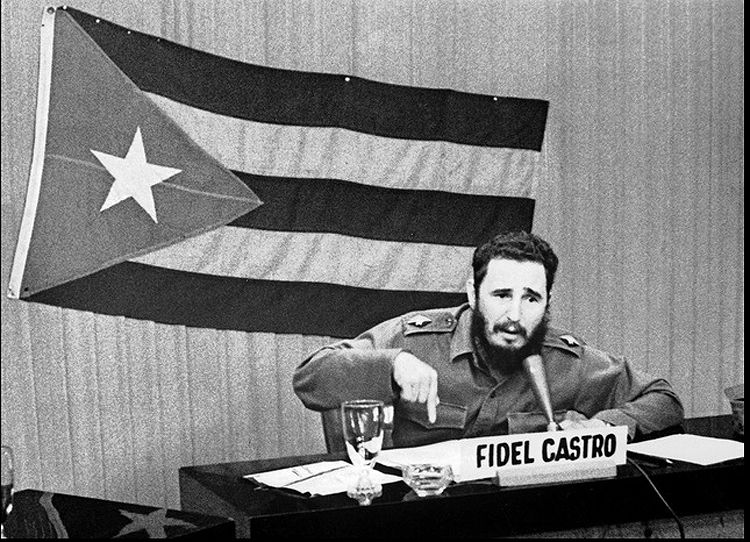
Fidel speaks on radio and on television during the Cuban missile crisis in 1962. (Photo: VNA)
Fidel speaks on radio and on television during the Cuban missile crisis in 1962. (Photo: VNA)
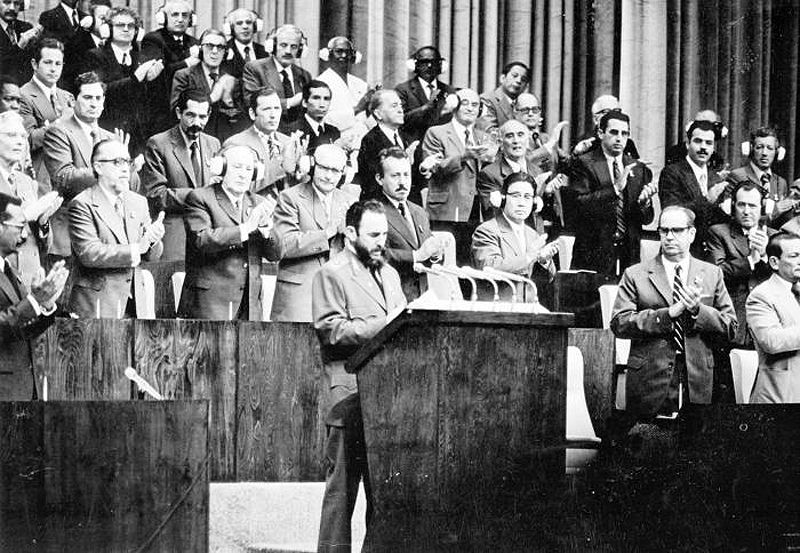
The first Congress of the Communist Party of Cuba takes place in December 1975 (Photo: GRANMA NEWS)
The first Congress of the Communist Party of Cuba takes place in December 1975 (Photo: GRANMA NEWS)
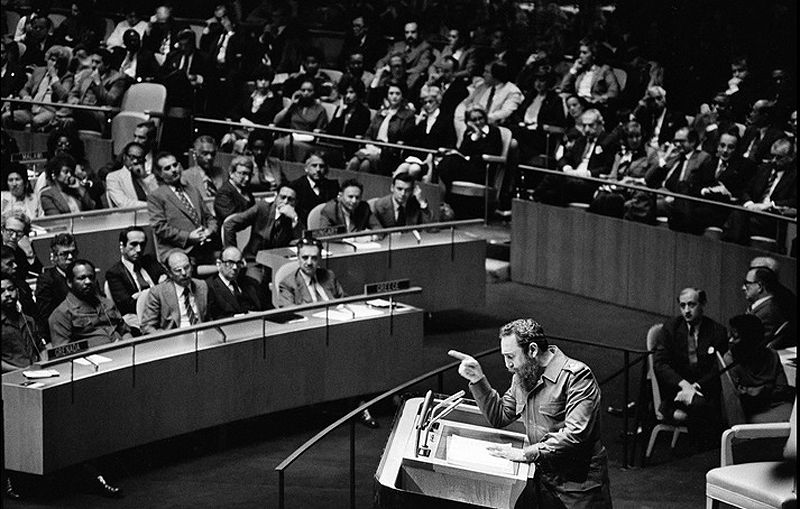
President Fidel delivering a speech at the United Nations in October 1979. (Photo: VNA)
President Fidel delivering a speech at the United Nations in October 1979. (Photo: VNA)
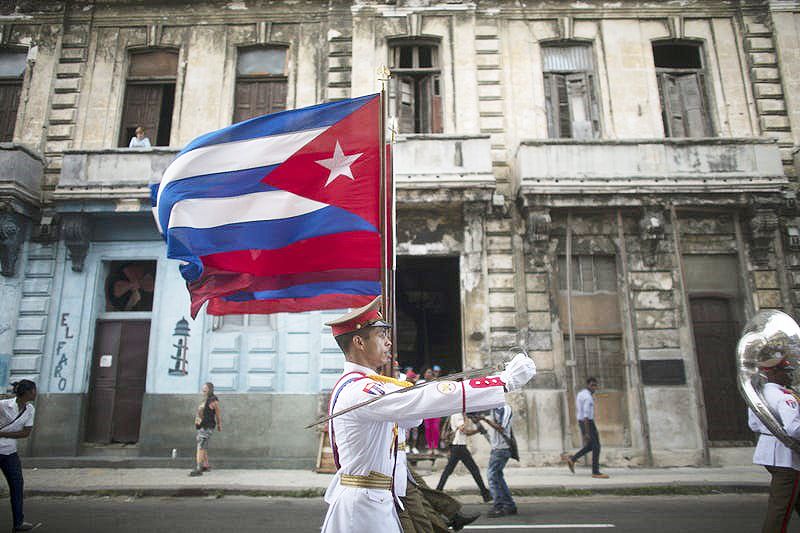
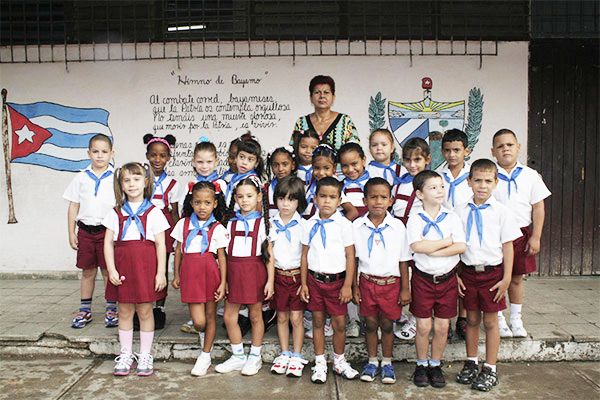
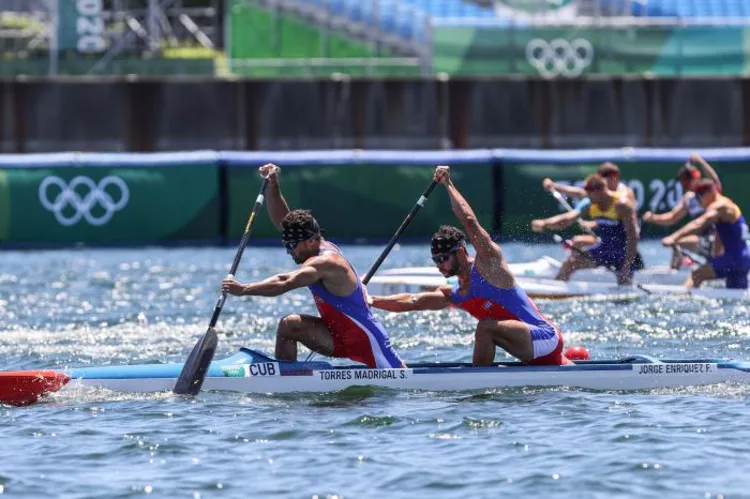
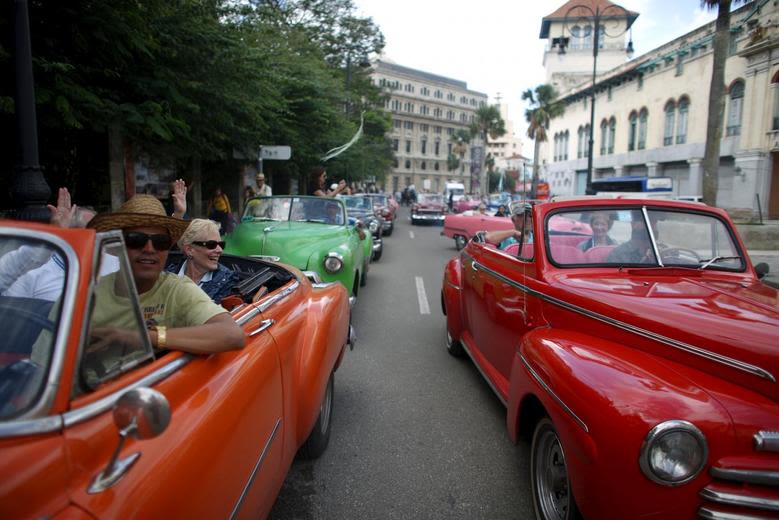
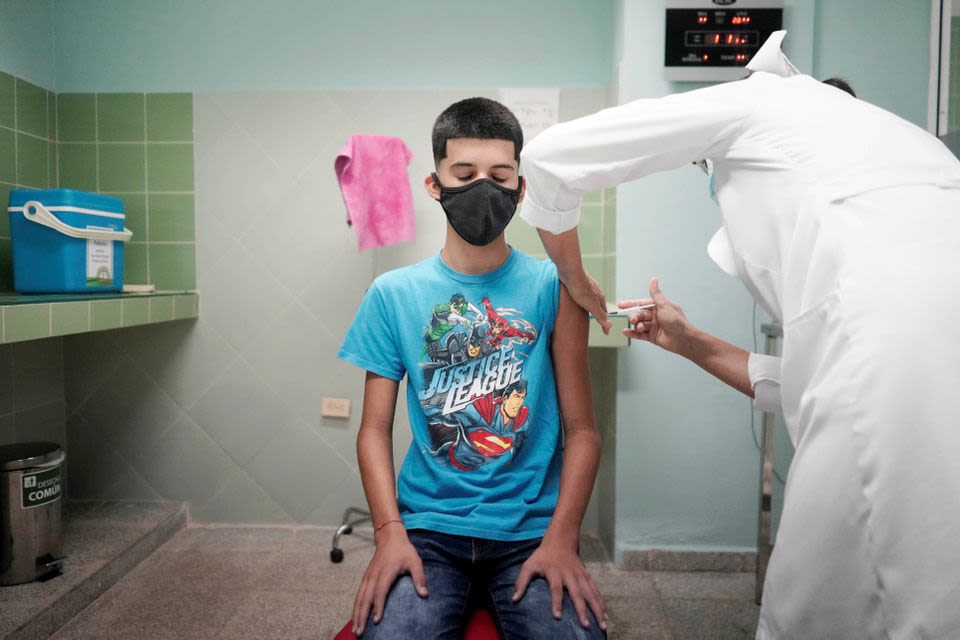

A Cuban soldier raises a flag during the commemoration of the student leaders killed in the war against Spanish rule. (Photo: Reuters)
A Cuban soldier raises a flag during the commemoration of the student leaders killed in the war against Spanish rule. (Photo: Reuters)

According to World Bank, Cuba has the highest investment in education worldwide with nearly 13% of GDP invested in this sector. Photo: Cuban children during the opening ceremony of the new school year (Photo: REUTERS)
According to World Bank, Cuba has the highest investment in education worldwide with nearly 13% of GDP invested in this sector. Photo: Cuban children during the opening ceremony of the new school year (Photo: REUTERS)

Cuban sports delegation won a remarkable achievement at the Tokyo 2020 Olympics, ranking 14th in the medal tally. (Photo: GRANMA newspaper)
Cuban sports delegation won a remarkable achievement at the Tokyo 2020 Olympics, ranking 14th in the medal tally. (Photo: GRANMA newspaper)

The peaceful life and classical architecture in Cuba attract tourists from around the world. In the photo: Tourists drive classic cars on the streets of Havana (Photo: REUTERS)
The peaceful life and classical architecture in Cuba attract tourists from around the world. In the photo: Tourists drive classic cars on the streets of Havana (Photo: REUTERS)

Cuba leads the world with the lowest patient to doctor ratio. Photo: Cristian Artimbau, 14, gets a dose of the Soberana 02 vaccine during its clinical trials at a hospital amid concerns about the spread of the coronavirus disease (COVID-19) in Havana, Cuba, June 29, 2021. (Photo: REUTERS)
Cuba leads the world with the lowest patient to doctor ratio. Photo: Cristian Artimbau, 14, gets a dose of the Soberana 02 vaccine during its clinical trials at a hospital amid concerns about the spread of the coronavirus disease (COVID-19) in Havana, Cuba, June 29, 2021. (Photo: REUTERS)
Under the leadership of the Communist Party of Cuba (PCC), with self-reliance, creativity, selfless labour, the Cuban people have overcome many difficulties, gradually gained achievements, and firmly defended their revolutionary achievements. The US orders on economic and financial embargoes and restrictions on trade and tourism at times almost suffocated the Cuban economy, but this did not prevent Cuba from entering trade and economic agreements with many countries to expand trade opportunities and export medical services, which is a strength of Cuba.
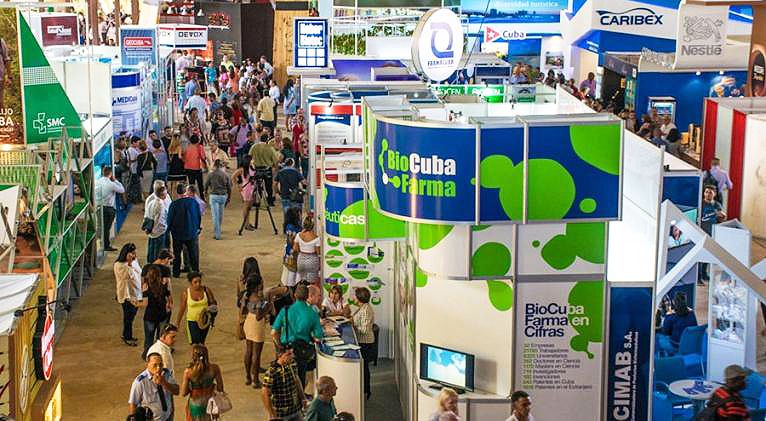
The 36th Havana International Trade Fair, 2018 (Photo: cubasi.cu)
The 36th Havana International Trade Fair, 2018 (Photo: cubasi.cu)
In difficulties, creativity and self-reliance have been promoted. In 2009, Cuba began to reform and apply a number of new economic policies. The line of updating the socio-economic development model was adopted by the PCC at its 6th Congress in 2011, marking an important milestone on the development path of Cuba. The reform orientation continued to be firmly affirmed at the 7th Congress in 2016.
The past 5 years of accelerating the process of updating the socio-economic development model have witnessed achievements marked by reform, particularly the adoption of the 2019 Constitution, which affirms to take revolutionary principles as the foundation for the development of the country and puts people at the centre of development policies. The Constitution defines the law-governed socialist State, facilitating the updating process.
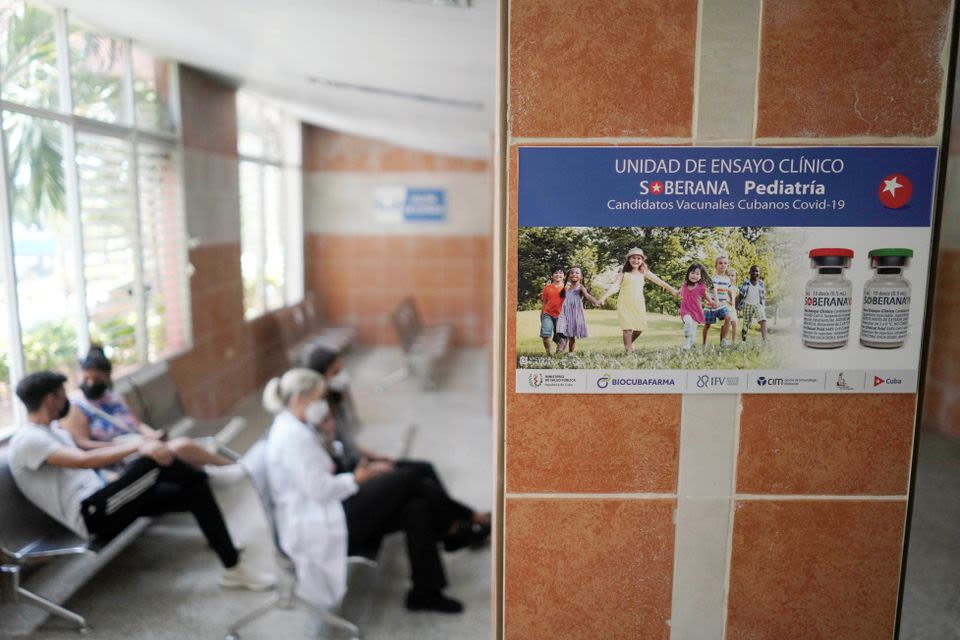
According to the Cuban Ministry of Public Health, more than 10 million doses of the Soberana 02, Soberana Plus and Abdala vaccines have been given to the people, about 4.1 million people have received at least one dose and more than 2.6 million people have been fully vaccinated to achive the goal of having 60-70% of the population vaccinated with homegrown vaccine by the end of August 2021. (Photo: People sit next to a sign announcing the clinical trials of the Soberana 02 vaccine at a hospital amid concerns about the spread of the coronavirus disease (COVID-19) in Havana, Cuba) (Photo: REUTERS)
According to the Cuban Ministry of Public Health, more than 10 million doses of the Soberana 02, Soberana Plus and Abdala vaccines have been given to the people, about 4.1 million people have received at least one dose and more than 2.6 million people have been fully vaccinated to achive the goal of having 60-70% of the population vaccinated with homegrown vaccine by the end of August 2021. (Photo: People sit next to a sign announcing the clinical trials of the Soberana 02 vaccine at a hospital amid concerns about the spread of the coronavirus disease (COVID-19) in Havana, Cuba) (Photo: REUTERS)
Alongside the recent US pressure to tighten the embargo policy, thus reversing the positive trend after the US and Cuba normalised relations at the end of 2014, the process of updating socio-economic development model in Cuba has also suffered negative impact from the unfavourable environment in the region, with leftist governments and progressive movements in Latin America encounterign a lot of turbulence.
However, that does not mean the updating process has stalled. The 8th Congress of the PCC in April 2021 accelerated the “ship of economic transformation”, with steadfastness spirit on the socialist path and ensuring the continuation of the revolutionary process. With the policy of self-determination of the nation's destiny and development path, with the spirit of the Giron victory, Cuba has established the basis to continue to overcome difficulties and gain achievements in the new revolutionary period.
“The Power of Compassion”
These days, like other places all over the world, Cuba is struggling with the devastation of the COVID-19 pandemic. Difficulties from the embargoes made the fight against the epidemic even more arduous, but did not prevent Cuba from carrying out its mission of providing medical assistance to many countries, promoting the noble international spirit of the Cuban people, which has been forged through many generations, becoming the outstanding identity of the small island in the Caribbean Sea.
As soon as the pandemic broke out, along with sharing experiences in the prevention, control and treatment of COVID-19, Cuba sent hundreds of doctors and medical workers to assist other countries in the region. At the height of the pandemic in Italy, the first group of more than 50 Cuban doctors arrived at the hotspot of Lombardy. They complemented the “brigade of compassion” of about 28,000 Cuban specialists and medical staff who have been present in 59 countries around the world at the time before the pandemic.
Up to now, about 4,000 Cuban doctors and nurses were sent to other countries; nearly 40 countries on 5 continents have received medical assistance and cooperation with Cuba amid the raging pandemic. The Nation, a US weekly journal estimated that no country has sent as many doctors abroad during the pandemic as Cuba, a demonstration of the spirit of genuine internationalism.
The delegation of Cuban doctors participating in the fight against COVID-19 in other countries is the latest vivid expression of the Cuban people's benevolent spirit. Cuba's international support in the medical field is not new thing; it is an important part of the Cuban Revolution's tradition of solidarity. The humanitarian mission began in the years when Cuba won its freedom. In 1960, Cuba sent a “medical brigade” to Chile to help treat victims of the earthquake. In 1963, a group of Cuban doctors were sent to assist with health care in Algeria as soon as the country was free from the colonial rule.
In 2005, speaking at the launching ceremony of the Henry Reeve International Medical Brigade (named after an US volunteer who fought with Cuban people against the colonialists), leader Fidel told the Cuban white blouse soldiers that becoming a doctor is like opening the door to noble actions. Throughout the nation's selfless history, Cuba has always been ready to provide medical assistance to all countries, without hesitation about ideological differences. And Cubans have never betrayed this noble ideal.
They are excellent doctors trained and selected by Cuba to perform humanitarian duties, always imbued with the noble international spirit of the communists and of Cuban revolutionary fighter Che Guevara (also a former doctor), white blouse soldiers of the Henry Reeve Brigade are ready to go to any place in the world that suffers from natural disasters or epidemics. They have become Cuba’s bridge to the world, from poor countries in Africa to rich Western countries, even to those that have no political links with the Caribbean island nation.
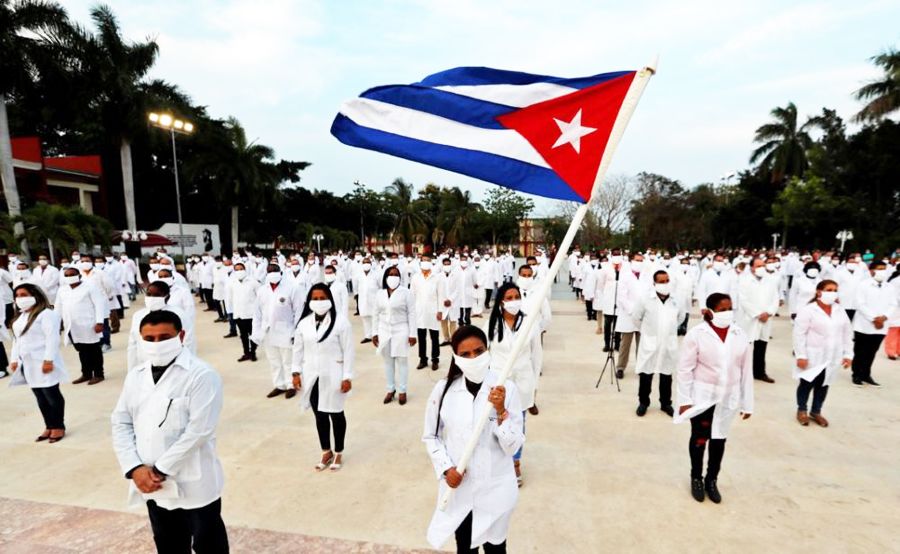
World Peace Council nominates Cuba's Henry Reeve medical brigade for the Nobel Peace Prize in 2020. (Photo: GETTYIMAGE)
World Peace Council nominates Cuba's Henry Reeve medical brigade for the Nobel Peace Prize in 2020. (Photo: GETTYIMAGE)
The World Health Organization (WHO) estimates that the Henry Reeve Brigade has saved more than 80,000 lives and treated nearly 3 million people during its 15 years of operation. They were present in Guatemala, Pakistan and Nepal after devastating earthquakes. They helped Haitian people overcome cholera, and went to West Africa to fight the Ebola epidemic...
In 2014, with more than 200 colleagues from the Henry Reeve Brigade on a medical support mission on the “West African front”, Doctor Felix Baez volunteered to go to Sierra Leon and unfortunately contracted Ebola after only a month of struggling with difficulties and providing examination and treatment for thousands of local patients. As soon as he recovered from his illness, after a period of harsh treatment in Switzerland, Doctor Felix Baez immediately asked to return to the “battlefield of Sierra Leon” to continue his unfinished mission.
The story of the Cuban volunteer doctor has inspired the spread of dedication and pure international spirit. In 2020, in recognition of Cuba's contribution, the World Peace Council (WPC) nominated the Henry Reeve Brigade for the Nobel Peace Prize, with the recognition that the Cuban medical delegation who carried out the mission to respond to disasters and critical epidemics displayed the truest example of international friendship.
Cuba is resiliently overcoming difficulties when responding to the pandemic, as the “heroic island nation” is steadfastly pursuing the chosen development path, despite the strict siege of sanctions and plots against the Cuban revolution. In difficult times, the noble international mission in the medical field shines even brighter. Although not rich in money, nor a big country in terms of deterrence weapons, Cuba is still a power – “A power of compassion”.
Vietnam - Cuba: Historical fate and special attachment
As it is fated, Vietnam and Cuba share similarities in their key events throughout history, which has not only changed the destiny of each country but also created a great source of encouragement for oppressed peoples all over the world. In the anti-colonial movement for national liberation, Vietnam recorded the global-shaking Dien Bien Phu Victory on May 7, 1954, while Cuba triumphed the Cuban Revolution on January 1, 1959, which was considered one of the most influential events in Latin America in the 20th century, leading to many changes in the regional political situation.
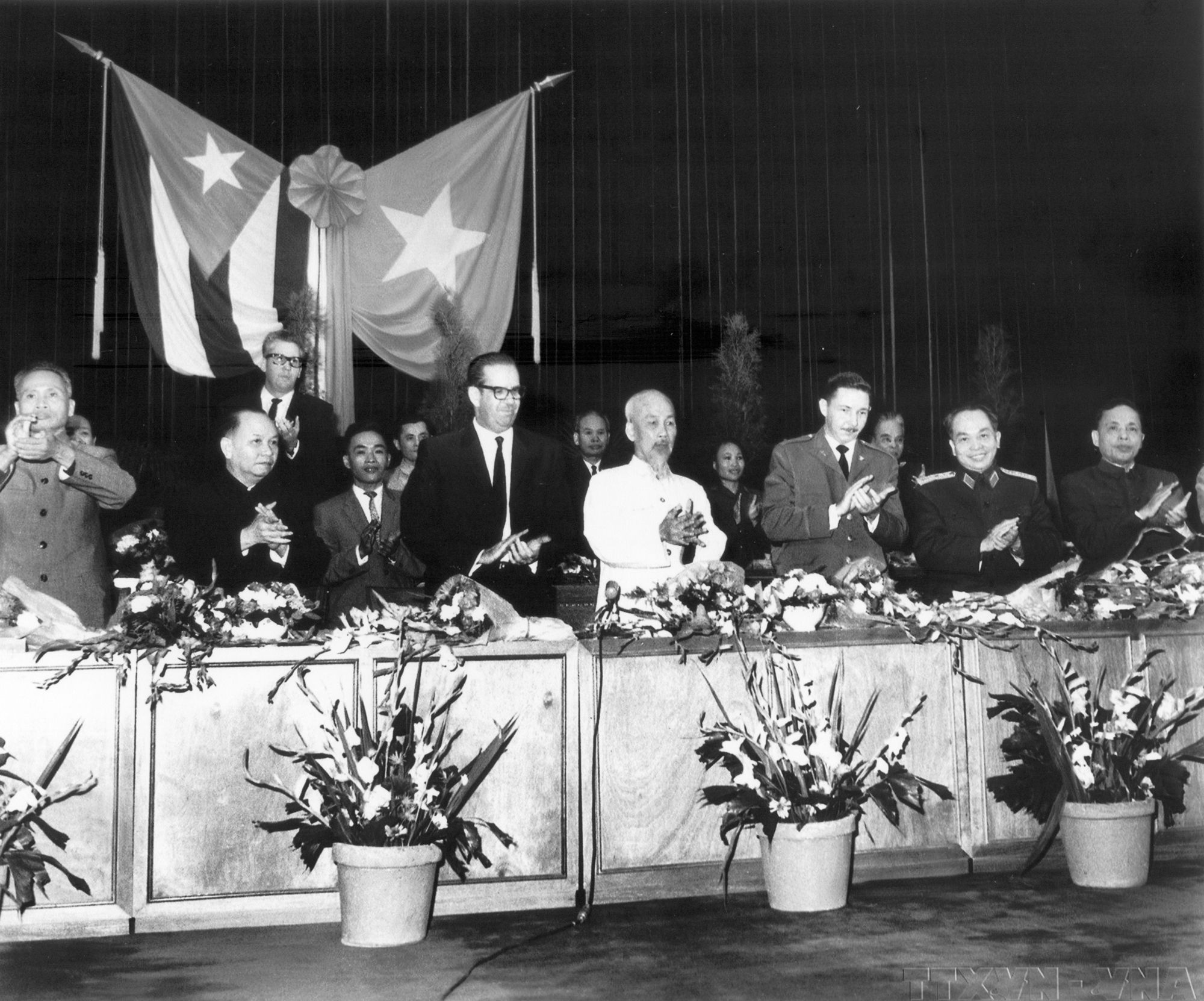
In the 60s of the 20th century, while Vietnamese people were exerting every effort to deploy the two strategic tasks of building socialism in the north and fighting for liberation in the south, the Cuban people had to fight against the destructive plots of the imperialists.
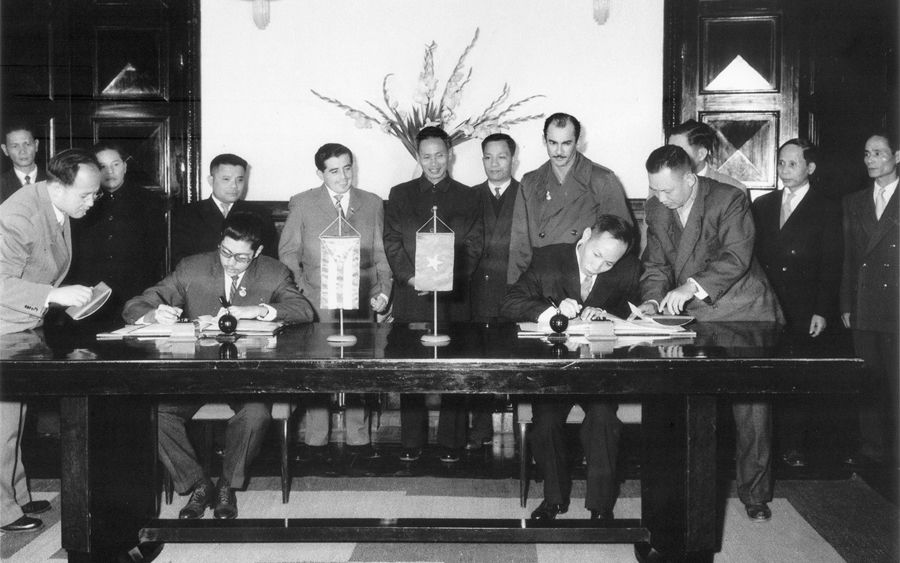
Delegates at the signing ceremony of the agreement to establish Vietnam-Cuba diplomatic relations in Hanoi on December 2, 1960. (Photo: VNA)
Delegates at the signing ceremony of the agreement to establish Vietnam-Cuba diplomatic relations in Hanoi on December 2, 1960. (Photo: VNA)
On December 2, 1960, the Republic of Cuba became the first country in the Western Hemisphere to establish full diplomatic relations with the Democratic Republic of Vietnam.
The similarities in the national construction and defence as well as the aspirations, revolutionary ideals, and heroic traditions of fighting for independence, freedom, sovereignty, and self-determination of the two countries have created favourable conditions and firm foundation for the special relationship between Vietnam and Cuba.
The loyal and pure friendship, which has been nurtured and promoted by President Ho Chi Minh, President Fidel Castro, and generations of leaders and people of the two countries, has become a valuable asset for the building and protection of socialism in each country, helping the two nations overcome the ups and downs of history over the past 60 years.
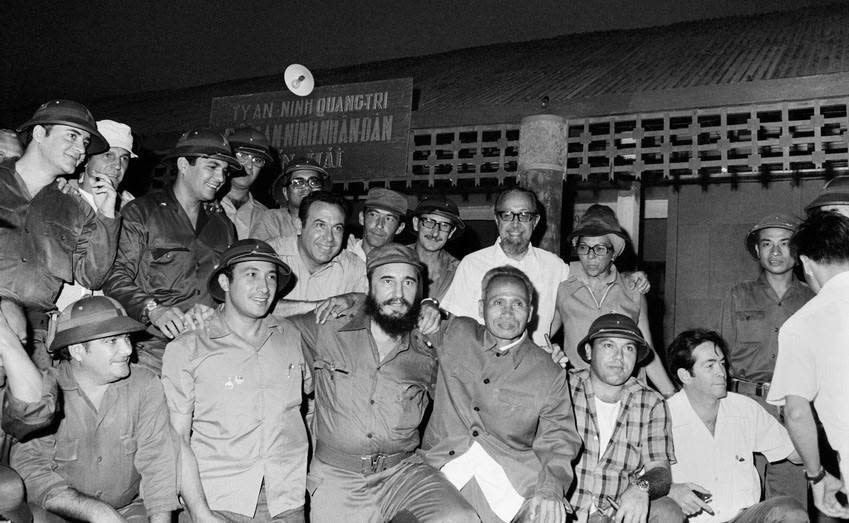
Prime Minister Pham Van Dong and Comrade Fidel Castro in Quang Tri Province, September 1973. (Photo: VNA)
Prime Minister Pham Van Dong and Comrade Fidel Castro in Quang Tri Province, September 1973. (Photo: VNA)
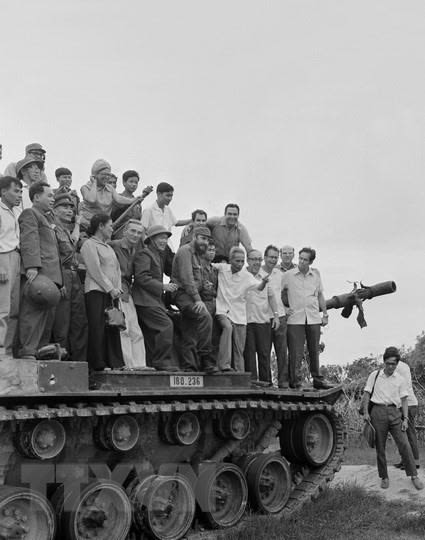
Cuban leader Fidel Castro visits the Tan Lam and Doc Mieu bases in McNamara Line (Electric Fence). (Photo: VNA)
Cuban leader Fidel Castro visits the Tan Lam and Doc Mieu bases in McNamara Line (Electric Fence). (Photo: VNA)
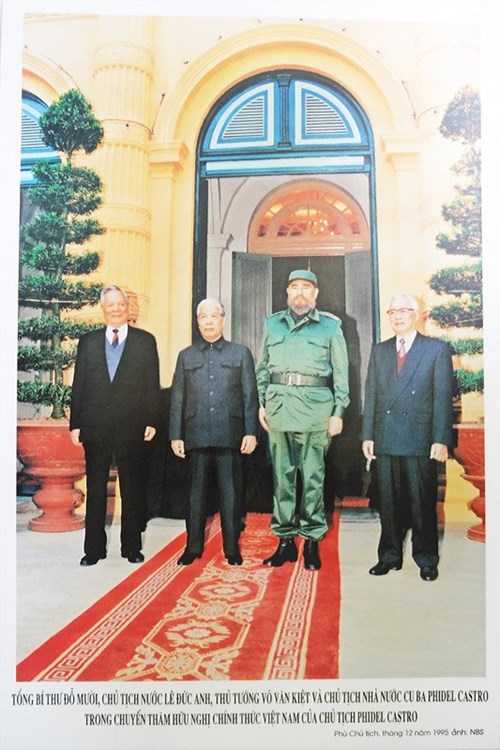
Party General Secretary Do Muoi, State President Le Duc Anh and Prime Minister Vo Van Kiet received Cuban President Fidel Castro during his official visit to Vietnam in 1995. (Photo: VNA)
Party General Secretary Do Muoi, State President Le Duc Anh and Prime Minister Vo Van Kiet received Cuban President Fidel Castro during his official visit to Vietnam in 1995. (Photo: VNA)
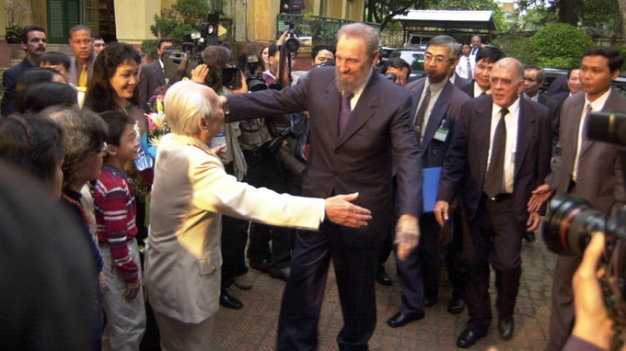
General Vo Nguyen Giap welcomes the Cuban leader during his visit Vietnam in 2003. (Photo: Xuan Gu)
General Vo Nguyen Giap welcomes the Cuban leader during his visit Vietnam in 2003. (Photo: Xuan Gu)
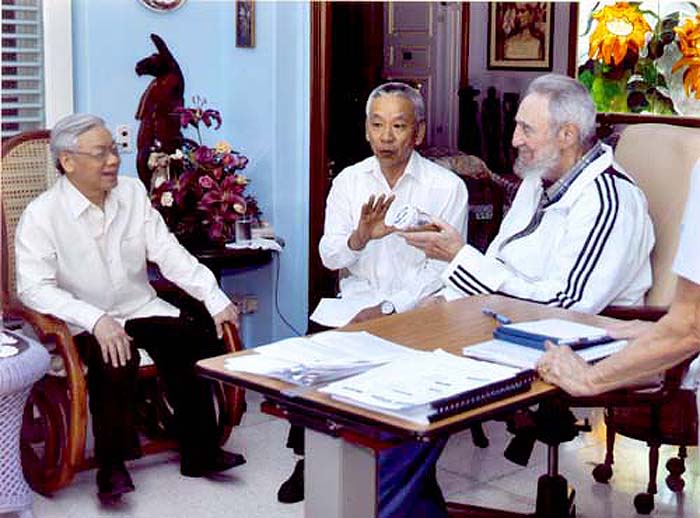
Party General Secretary Nguyen Phu Trong visits Cuban leader Fidel Castro during his official visit to Cuba in April 2012 (Photo: GRANMA NEWS)
Party General Secretary Nguyen Phu Trong visits Cuban leader Fidel Castro during his official visit to Cuba in April 2012 (Photo: GRANMA NEWS)
Fidel’s famous saying “For Vietnam, we are willing to give even our own blood” has always been held in the hearts of the Vietnamese people. Fidel was also remembered as the first foreign leader to visit the newly liberated area in Quang Tri on September 16, 1973.
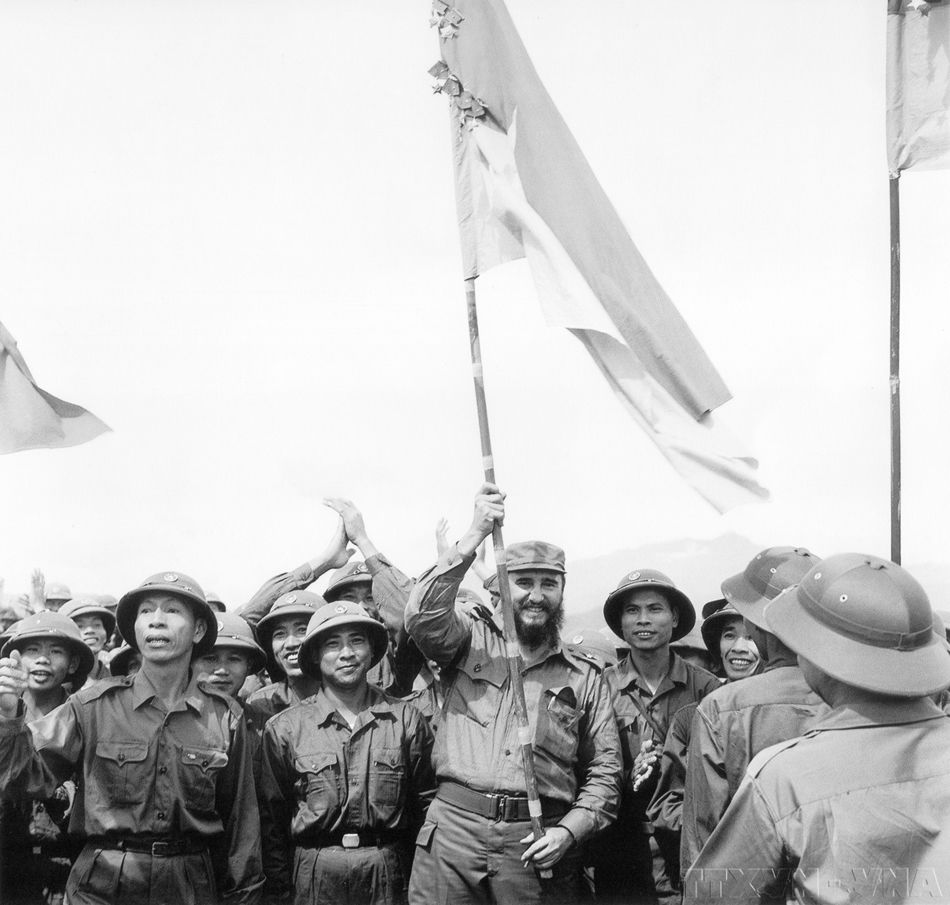
Cuban leader Fidel Castro raises Khe Sanh Battalion’s flag while meeting with liberation soldiers in Quang Tri (Photo: VNA)
Cuban leader Fidel Castro raises Khe Sanh Battalion’s flag while meeting with liberation soldiers in Quang Tri (Photo: VNA)
At a critical time in the struggle of the Vietnamese people, Fidel turned his foreign trips into campaigns to encourage the government and people of the countries to unite and support Vietnam. As the highest leader of the Party and State, Fidel Castro also joined marches with the whole population showing solidarity with Vietnam.
Overcoming geographical distance and difficult circumstances, Cuba has always stood shoulder to shoulder and provided support for Vietnam as a sincere friend and a trusted comrade. Cuba was always at the forefront of the international movement to support Vietnam’s resistance war against the US for national salvation and reunification.
In the early 1960s, despite being imposed with trade embargo, Cuban Government and people still gave a helping hand to Vietnam. Under the direct guidance of Fidel Castro, the Cuban Committee for Solidarity with South Vietnam was born, spreading the solidarity and support for Vietnam to Cuban schools, hospitals, factories, construction sites, armed forces and all Cuban people.
Following the slogan “All for Vietnam”, it became a nationwide movement in Cuba. There is no other country in the world like Cuba, where there are thousands of factories, schools and neighbourhoods named after heroes and places of Vietnam.
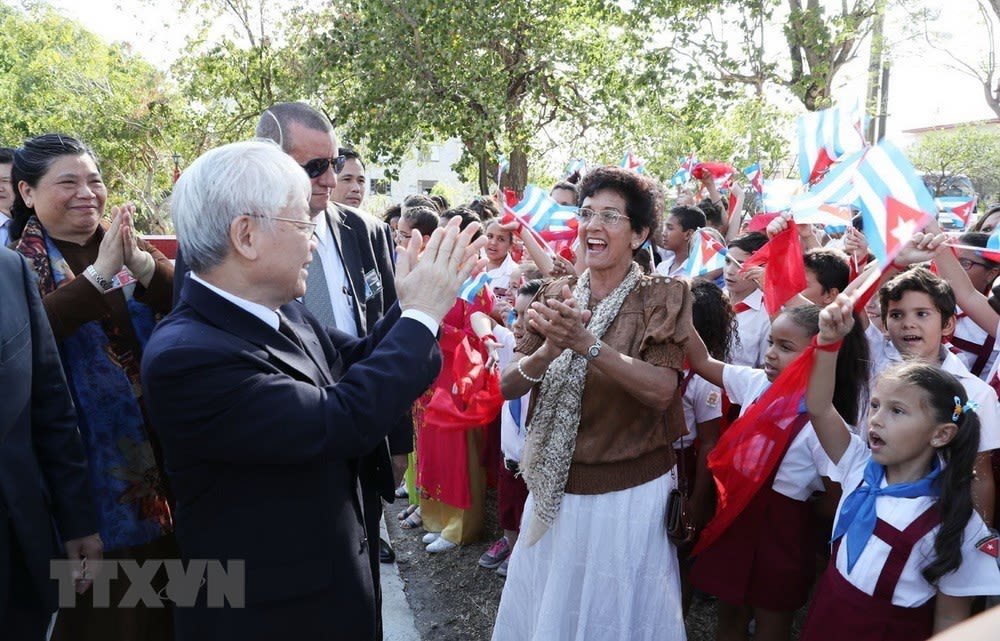
Party General Secretary Nguyen Phu Trong meets with Cuban people and students at the Ho Chi Minh Monument during his visit to Cuba in March 2018 (Photo: VNA)
Party General Secretary Nguyen Phu Trong meets with Cuban people and students at the Ho Chi Minh Monument during his visit to Cuba in March 2018 (Photo: VNA)
In response to the wholehearted attachment of Cuban people, Vietnam has always shown special friendship, solidarity, and sincere cooperation towards Cuba, considering support for Cuba as a natural obligation stemming from conscience and the nation's tradition of friendship and humanity. Following the teachings of President Ho Chi Minh, generations of Vietnamese leaders and people have always held that solidarity and support for Cuba is the conscience and responsibility of the communists and the entire Vietnamese people, and the country’s faithfulness to comrades and friends.
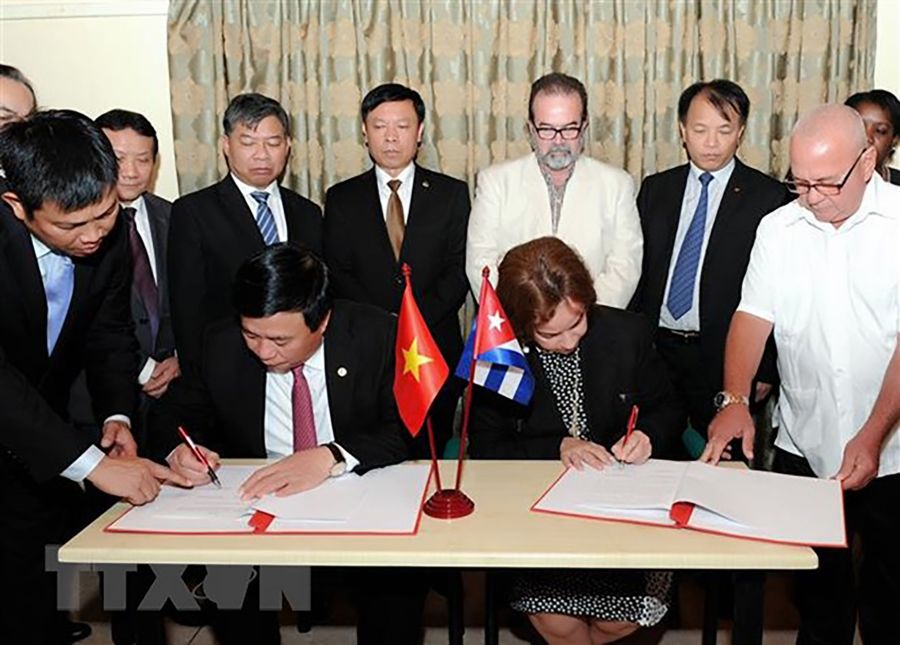
The fourth theoretical symposium between the Communist Party of Vietnam (CPV) and the Communist Party of Cuba (Photo: VNA)
The fourth theoretical symposium between the Communist Party of Vietnam (CPV) and the Communist Party of Cuba (Photo: VNA)
After the national liberation and entering the country’s reconstruction, Vietnam has cooperated with Cuba to draw on the lessons learnt from victories and contribute to the doctrine of “people’s war to protect the Fatherland against invaders”. Vietnamese people unanimously endured difficulties and sacrificed their interests to support Cuba, helping it to overcome the “Special Period.”
Vietnam has deployed many aid and cooperation projects, particularly those helping Cuba to produce rice and gradually ensure food security. Vietnam wholeheartedly shares its experience in socio-economic development and international integration with Cuba. The solidarity and support for Cuba has always been consistently and strongly expressed by Vietnam at international forums.
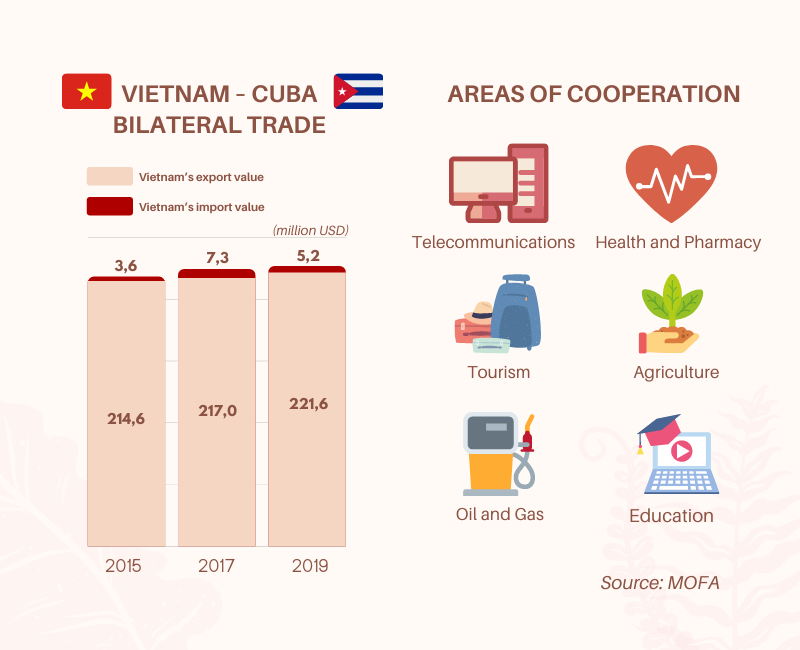
Experiencing the ups and downs of history, the two countries are now facing new opportunities and challenges. While Vietnam is entering a period of deeper international integration, Cuba is also focusing on updating its economic development model. The bilateral political relations between the two countries continued to be strongly consolidated, with regular visits from the highest levels of the Party and State to ministries, sectors and localities.
Both Vietnam and Cuba agreed to assess the two countries as important economic partners. Vietnam was selected by Cuba to be the first partner in Asia to research, negotiate and sign a new trade agreement. Vietnam has become Cuba’s second largest trading partner in Asia and Oceania and is Cuba’s main rice supplier. In the context of the complicated and unpredictable international situation, the two countries have closely worked together at international forums to uphold the fundamental principles of the United Nations Charter and international law while protecting the rights and interests of developing countries.
Nurtured by the glorious history and the revolutionary process in both countries as well as pure comradeship and brotherhood, who share the common goal and noble ideals, the special relationship between the two Parties and people has always been praised as exemplary brotherhood, traditional friendship, comprehensive cooperation and faithful solidarity. Vietnam and Cuba have favourable conditions to further develop the strong bilateral relationship in the spirit of independence, self-reliance, equality and mutual benefit, for the revolutionary cause of each country, thus contributing to peace, stability, cooperation and development in the region and the world at large.
Content: SON NINH
Translation: KHANH BINH, THU HANG
Photos: VNA, Vietnam Union of Friendship Organisations (VUFO), GRANMA, CUBADEBATE, REUTERS, VGP, VOV